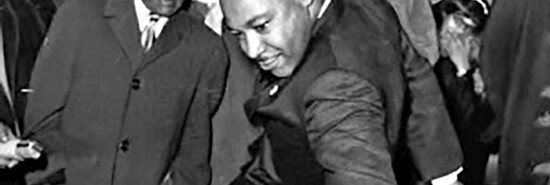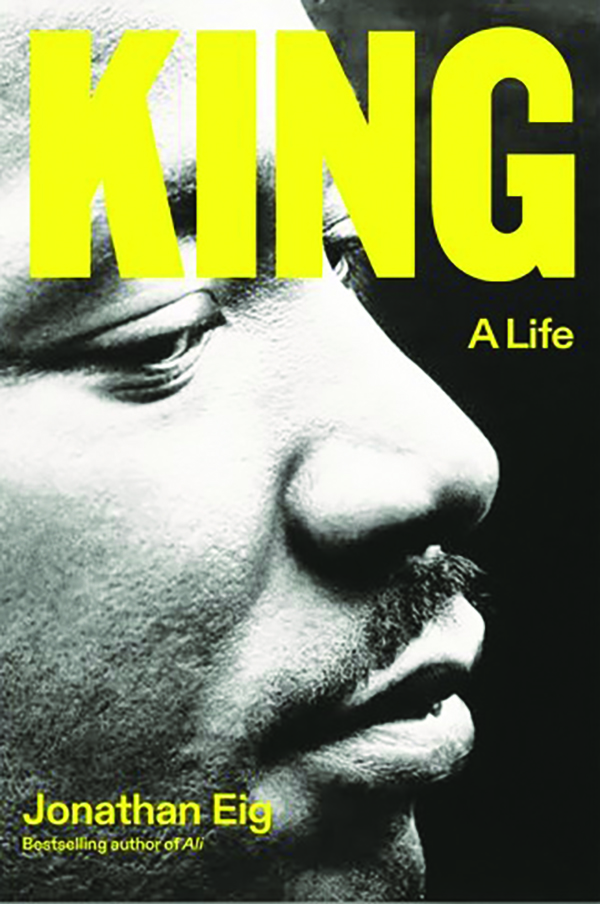
Review of King: A Life by Jonathan Eig
Matt Johnson
A Time cover story published on Feb. 18, 1957, approvingly described Dr. Martin Luther King Jr. as a humble and practical activist who “outgeneraled Montgomery’s white officials” but spurned the “excesses of radicalism.” This is the framing most people are used to: King as the restrained counterweight to fiery figures like Malcolm X and Stokely Carmichael — the moderate voice of the civil rights movement. It’s also the version of King that Jonathan Eig, author of the sweeping new biography King: A Life, believes we should reconsider. Eig wants readers to embrace “the complicated King, the flawed King, the human King,” and, perhaps most importantly, “the radical King.”

Eig’s biography is the first major work to be published on King’s life in many years, and the flaws and complications of that life are not mere footnotes. King’s infidelity, for instance, doesn’t just reveal his human weaknesses. Eig draws upon recently declassified FBI documents, recordings, and other material to expose how the U.S. government weaponized King’s personal indiscretions and waged a relentless campaign of blackmail and intimidation against him. Eig says he wanted to keep the reader’s focus where it belongs — not on lurid details for their own sake but on J. Edgar Hoover’s yearslong campaign to destroy the most important leader in the civil rights movement.
SOHRAB AHMARI’S SPIRAL AROUND LIBERALISM
Eig explores why Hoover obsessively sought to discredit King. Was it King’s relationships with former communists? His opposition to the Vietnam War? His political influence? These are all important factors, but there was a more fundamental reason for Hoover’s ire: “In a way,” Eig writes, “Hoover read King correctly at a time when few others did. While Malcolm X and others criticized King for being too conservative, and high-ranking officials in the Justice Department saw King as a reasonable reformer, Hoover recognized King for the radical he was.”
Eig provides an absorbing account of King’s intellectual development and draws a clear line from his formative influences to his activism. At Crozer Theological Seminary, Eig writes that King “experienced a crisis of confidence … while reading Nietzsche, who described Christianity’s call for universal love as a sign of weakness. King wondered for a time if Christ’s instruction ‘Love your enemies’ (Luke 6:27) really had enough power to resolve conflicts among nations or racial groups.” However, when King discovered Reinhold Niebuhr’s 1932 book, Moral Man and Immoral Society, he began to see more clearly how Christian love could be channeled into political action — especially in the form of nonviolent protest. Niebuhr suggested that black people look to Gandhi’s example of nonviolent resistance in India.
King never strayed from his commitment to nonviolence, and the rest of his life was a heroic rejoinder to Nietzsche. Even as bombing campaigns terrorized, murdered, and maimed black people in Montgomery and Birmingham, King urged his supporters to love their enemies and turn the other cheek. Despite attempts on his life and the bombing of his own home, King rejected armed security (initially at the urging of Bayard Rustin, though he reaffirmed the decision many times). “We no longer have a choice between violence and nonviolence,” King said. “It is either nonviolence or nonexistence.”
When people reflect on the civil rights movement today, it’s difficult to shake a sense of historical inevitability. King once described Dec. 5, 1955 — the inauguration of the Montgomery bus boycott (Rosa Parks was arrested on Dec. 1), which would set the United States on a course toward full legal integration — as the “day of days.” According to Eig, this was the day “King found his voice, preaching a mixture of political agitation and gospel, making the radical seem reasonable, perhaps inevitable.” But what Eig demonstrates again and again is that historical progress is anything but linear or inevitable. It requires tireless, ceaseless, and often thankless work.
King led a foundational social and political transformation with tactics that would admonish and challenge, but not alienate, millions of people. His genius as an activist was in his pursuit of radical change with rhetoric and political action that appealed to the mainstream. Eig explains that King “reminded the people that their advantage was in their moral superiority. … They meant to reform American democracy, not overthrow it.” This is why he’s regarded as a moderate today, but this view wasn’t shared by many of his political opponents, from the FBI director to the many mayors, police chiefs, and governors who saw him as a radical menace.
While the moral force of King’s activism is clear to almost everyone today, this was not always the case. As the demand for “Black Power” became louder in the late 1960s, King’s approach fell out of favor with many black people who were tired of turning the other cheek, only to be struck once again by their oppressors. At the same time, white elected officials accused King of fomenting violence across the country, while Hoover attempted to convince President Lyndon B. Johnson that King condoned rioting and had prior knowledge of a plan to set fires in the Chicago Loop. This was when King’s relationship with Johnson was already under strain due to his resistance to the Vietnam War.
King’s pragmatism and political victories shouldn’t obscure the bitter controversies that swirled around his work — including within the civil rights movement — which Eig chronicles carefully and exhaustively. None of these controversies were more intense than the one over Vietnam. Rustin and other leaders of the movement couldn’t understand why King was using his platform as the most influential champion of civil rights in the United States for anti-war activism. After he delivered his “Beyond Vietnam” speech on April 4, 1967, Eig writes, “Almost overnight, King became the nation’s most famous opponent of a war that had the approval of an overwhelming majority of Americans. Newspaper editorials questioned not only his patriotism, but even his commitment to civil rights.” King understood the political risk of speaking out on Vietnam, and he accepted this risk because “my conscience leaves me no other choice.”
King took other political risks, too. While the horrors of racism were more immediately visible in the South, King always emphasized the existence of de facto segregation in the North — a phenomenon he regarded as even more pernicious than legal segregation (and a glimpse at what he might have to say about persistent racial inequality today). King delivered a May 1957 address to the Prayer Pilgrimage for Freedom in Washington, D.C., in which he criticized “white Northern liberals” whose peculiar form of liberalism was “so bent on seeing all sides that it fails to become committed to either side.” He called for a muscular and progressive liberalism that “will not be deterred by the propaganda and subtle words of those who say, ‘Slow up for a while; you’re pushing too fast.’”
King’s desire to expand the civil rights movement to Chicago and throughout the country led many to claim he was moving too fast, just as his campaign against poverty and war invited accusations of hubris. But every great social movement in American history has confronted such accusations — and often from those who claim to be sympathetic to the cause. Eig reminds us that President John F. Kennedy described the March on Washington as a “great mistake.”
On the morning of Dec. 21, 1956, Ralph Abernathy and Glenn Smiley boarded a newly integrated Montgomery bus with King. Photographers and reporters awaited them downtown, and when King disembarked, he said it had been a “mighty good ride.” The Montgomery bus boycott was only the beginning of a ride that would lead to the most transformational social and political movement in American history. Eig carefully documents this journey — as well as King’s early years as a student, preacher, and activist — with a vast trove of archival material and interviews that bring King back to us more vividly than ever before. The portrait that emerges is of a man who was grounded in the country’s oldest and deepest democratic values but who was radical enough to demand the full realization of those values for everyone.
CLICK HERE TO READ MORE FROM THE WASHINGTON EXAMINER
Matt Johnson is a writer whose work has been published in the Bulwark, Quillette, Haaretz, American Purpose, the Daily Beast, and many other outlets. He is the author of How Hitchens Can Save the Left: Rediscovering Fearless Liberalism in an Age of Counter-Enlightenment.
